
Oslo Dokumentarkino er støttet av Institusjonen Fritt Ord, Oslo kommune, Bergesenstiftelsen og Norsk filminstitutt.
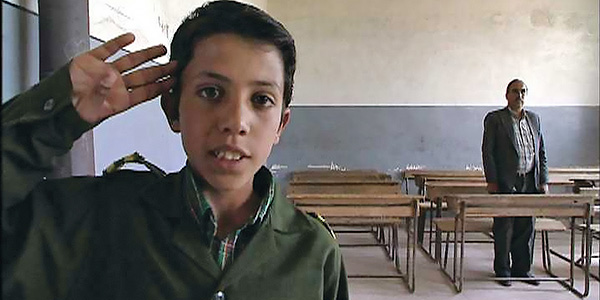
Saturday 8th, Sunday 9th and Monday 10th, Sept. 2018
at Cinemateket:
Syrian Doc Days - Oslo
What Syria was and must not be
Three days with films and talks
Guests:
Faraj Bayrakdar, Ossama Mohammed, Monika Borgmann, Kjetil
Selvik and Zeina Bali (others to be
confirmed)
Buy tickets at cinemateket.no
In
collaboration with Syrian Peace Action Centre (SPACE) and
Cinemateket
Syria under the Assad regime: Institutionalized humiliation
In this first ever Syrian Doc
Days in Oslo we will take a deep look into the Syrian
society under the authoritarian rule of the Baath party and the
Assad regime.
Through documentary films and discussions we will examine the relationship between the Syrian state and its citizens and how Syrians under the one-party rule were subjected to systematic censorship and institutionalized humiliation.
On the last day we will look at how Syrians in exile, fleeing the war, are forced into new hierarchies of oppression.
Through documentary films and discussions we will examine the relationship between the Syrian state and its citizens and how Syrians under the one-party rule were subjected to systematic censorship and institutionalized humiliation.
On the last day we will look at how Syrians in exile, fleeing the war, are forced into new hierarchies of oppression.
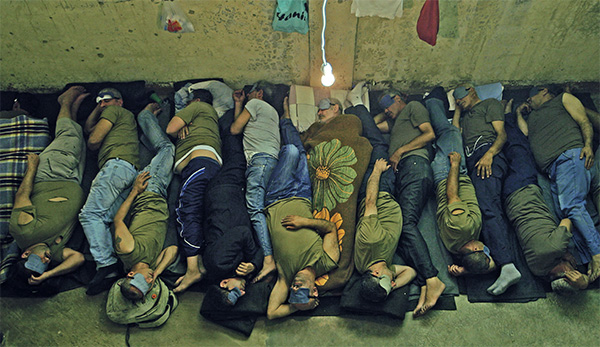
Public Theaters of Humiliation
The film A Flood in Baath Country from 2003 zooms in on a Syrian village that represents a microcosm of the Baath party and their rule. The leaders promised socialism but instead introduced a strict autocracy that forced people into submission through brutal force, indoctrination and systematic humiliation that started in primary schools. Step by Step is an experimental documentary film from 1978, by Osama Mohammed, that shows the harsh reality of the dictatorship and the consequences for people and society.Between and after the films, Syrian filmmaker Ossama Mohammed, director of Step by Step, and Kjetil Selvik will talk about the Syrian society and how it is to make films under a dictatorship.
Films: A Flood in Baath Country (2004, 47 min.)
Step by Step (1978, 23 min.)
Guests:
Ossama Mohammed, award-winning film director, and senior researcher at NUPI Kjetil Selvik will be present. Zeina Bali fra SPACE will introduce and host the event.
Day 2: Sunday September 9th. 14:00 - 17:00
From Schools to Prisons
Tadmor from 2016 reconstructs the infamous Tadmor torture prison in Palmyra in Syria. The film is an attempt by former prisoners to come to terms with the incomprehensible brutality and humiliation they were subjected to over years. Tens of thousands of people have died in state run prisons as a result of torture or starvation.Film: Tadmor (2016, 103 min.)
Guests:
Former prisoner in Tadmor, Faraj Baraykdar and film director Monika Borgmann will talk before and after the screening of the documentary film Tadmor.
Day 3: Monday September 10th. 17:00 - 19:00
In Exile
Taste of Cement from 2017 shows how Syrian workers in exile are exposed to new types of oppression. In this visually beautiful, stylized documentary Syrian refugees in Beirut are working on the reconstruction of a city that was destroyed not that long ago, in contrast to their own country which is being destroyed, exposing the meaningless cycles of destruction and construction that war feeds.Film: Taste of Cement (2017, 85 min.)
Guests to be confirmed.
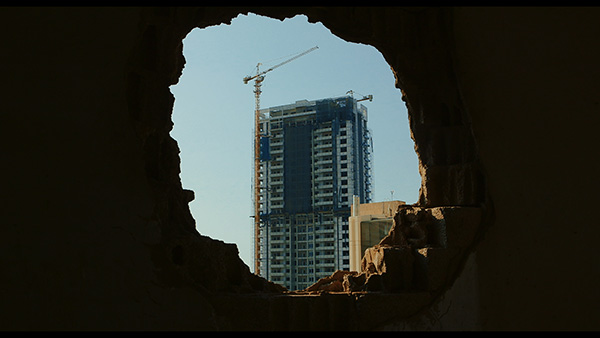
GUESTS:

Ossama Mohammed is a Syrian screenwriter, cinematographer and film director. He graduated from VGIK in 1979, where he studied at the Laboratory of Igor Talankin. His diploma film was the short documentary Step by Step. He completed his first fiction feature Stars in Broad Daylight in 1988. The title refers to Igor Talankin’s film with the same title. Deemed to be the most scathing critique of contemporary Syrian society trapped in the iron grip of the Baath regime, the film has never been allowed a public screening in Syria. Internationally it earned the filmmaker great critical praise. His films, Sacrifices (2002) and Silvered Water - Syria Self Portrait (2014) were shown at Cannes Film Festival.
Monika Borgmann is a filmmaker and co-director of NGO UMAM Documentation & Research. She studied Arabic and Political Sciences in Bonn and Damascus. She worked as freelance journalist in the Middle East and North Africa for over a decade. Since 2001, she lives in Beirut where she co-founded the NGO UMAM Documentation & Research and the online archive Memory at Work.
Kjetil Selvik is Senior Researcher in NUPI’s Research Group on Peace, Conflict and Development. He holds a PhD in political science from Sciences Po in Paris and works on struggles over states and regimes in the Middle East. Selvik har previously worked as researcher at Fafo and at the Chr. Michelsen Institute (CMI) and been Adjunct Associate Professor at the Department of Comparative Politics, University of Bergen, and at the Department of Culture Studies and Oriental Language, University of Oslo.
Zeina Bali is from Syria. She lives in Norway and is one of the founders of SPACE (Syrian Peace Action Centre). Zeina has worked and done research with several NGOs and non-profits in Syria, Turkey, and Norway on education and youth engagement.
FILMER:
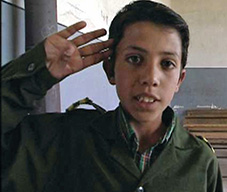
A Flood in Baath Country
Omar Amiralay, France 2004, 47 min.
Screening Saturday Sept. 8.
A Flood in Baath Country
A Flood in Baath Country from 2004 is the last film of a trilogy by Omar Amiralay about the Syrian Baath Party (the party of the Assad regime) and one of the regime's prestige projects: the construction of the Tabqa Dam in the Euphrates valley. The two first films were made in 1970 and 1974.In A Flood in Baath Country he returns to the valley that is now home to Lake Assad. In the village of Al Mashi, he finds the perfect microcosm of the Baath Party regime, which promised socialism but instead introduced a strict autocracy in which old tribal structures were preserved.
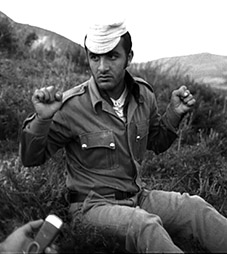
Step by Step
Ossama Mohammed, Syria 1978, 23 min.
Screening Saturday Sept. 8.
Step by Step
Step by Step is a reflection of the foundations of Syrian society under Assad rule. Ten years before filmmaker Ossama Mohammed received international recognition with Stars in Broad Daylight (1988) and 36 years before his award winning film Silvered Water - Syria Self Portrait 2014), he captured the dire state of Syria in this short documentary.Through the film’s experimental style, a harsh reality bubbles ever closer to the surface. The apparently harmonious countryside turns out to be strict, choking and violent. The effects of this are clearly demonstrated as a soldier talks about his childhood, in between the impressions of village life. Freedom and innocence have made way for a disturbing, fanatical loyalty to the state.
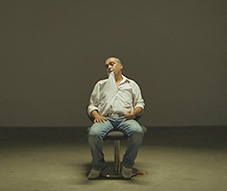
Tadmor
Monika Borgmann & Lokman Slim,
Lebanon, France, Switzerland, Qatar, United Arab Emirates 2016, 103 min.
Screening Sunday Sept. 9.
Tadmor
After the Syrian uprising of 2011, eight former political detainees decided to break the silence about the years they spent in the infamous Tadmor Prison (Palmyra), the harshest prison of Assad's regime.As they know that words alone fall short of expressing the cruelty of the torture, fear, contempt and humiliation they suffered, they decided to relive, together, their ordeal. Tadmor is a story about the inhumanity of the regime but also about the prisoners' will to survive. Thousands of other detainees in Tadmor did not.
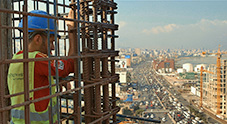


Taste of Cement
Ziad Kalthoum, Lebanon, Germany, Qatar, Syria, United Arab Emirates 2017, 85 min.
Screening Monday Sept. 10.
Taste of Cement
While Syria lies in ruins, Syrian refugees are taking jobs as construction workers in Lebanon. Taste of Cement is a different film about war and life in exile.Visually stunning images and a dreamlike narrator evokes a realisation of the enormous destruction of war and a feeling of despair as to how the country will be rebuilt.
It’s an impressive feat of formalistic filmmaking that has garnered several awards on the festival circuit and deserves further attention abroad. (...) An arresting mediation on construction and destruction.
- Hollywood Reporter
Ziad Kalthoum’s award-winning documentary Taste of Cement is an audio-visual masterpiece.
- Modern Times Review
TRAILER: TADMOR
Tadmor
Monika Borgmann & Lokman Slim,
Lebanon-France-Switzerland-Qatar-United Arab Emirates 2016, 103 min.
TRAILER: TASTE OF CEMENT
Taste of Cement
Ziad Kalthoum,
Lebanon, Germany, Qatar, Syria, United Arab Emirates 2017, 85 min.

Dronningensgt. 16 i Oslo.
Saturday, Sunday, Monday, Sept. 8th-10th.
Syria Doc Days
Films and talks
Tickets:
kr. 50 per day.Tickets can be bought online at cinemateket.no or over the counter at Filmens hus.
Do you want to sign up for our newsletter?
Send en epost til: post(a)dokumentarkino.no
og skriv 'påmelding' i emnefeltet
Send an email to
post(a)dokumentarkino.no
and write "påmelding" in the subject field.
Hvis du er på vår epost-liste men
ikke ønsker å motta informasjon:
Send en epost til post(a)dokumentarkino.no
og skriv 'avmelding' i emnefeltet.
To unsubscribe; send an email and write 'avmelding' in the
subject field.
Ketil Magnussen
Oslo Dokumentarkino
Tel: +47 - 95 18 51 09
first name (a) dokumentarkino.no
